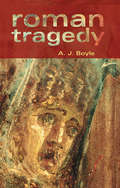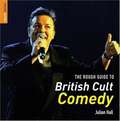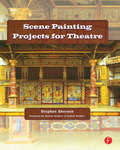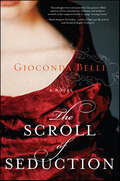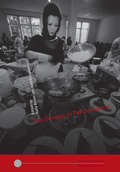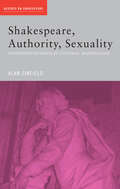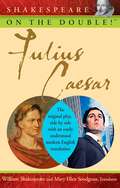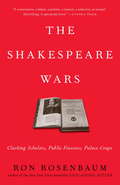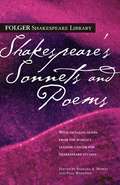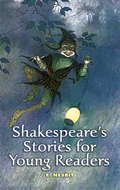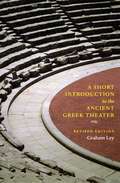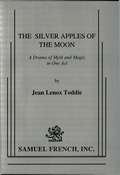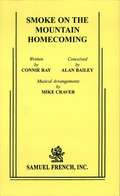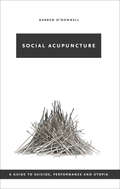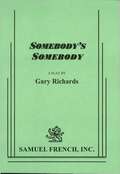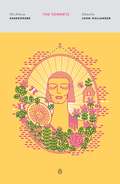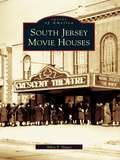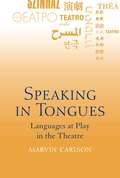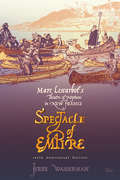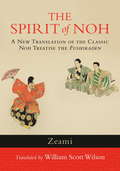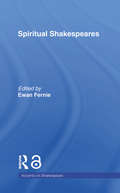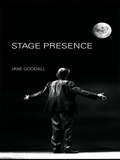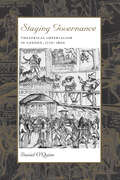- Table View
- List View
Roman Tragedy
by Anthony J. BoyleThe first detailed cultural and theatrical history of a major literary form, this landmark introduction examines Roman tragedy and its place at the centre of Rome’s cultural and political life. Analyzing the work of such names as Ennius, Pacuvius and Accius, as well as Seneca and his post-Neronian successors, Anthony J. Boyle delves into detailed discussion on every Roman tragedian whose work survives in substance today. Roman Tragedy examines: the history of Roman tragic techniques and conventions the history of generic form and change the debt that Rome owes to Greece, and text owes to text the birth, development and death of Roman tragedy in the context of the cities evolving, institutions, ideologies and political and social practices tragedy proper and the historical drama (fabula praetexta), which the Romans allied to tragedy. With parallel English translations of Latin quotations, this seminal work not only provides an invaluable resource for students of theatre, Roman political history and cultural history, but it is also accessible to all interested in the social dynamics of writing, spectacle, ideology and power.
The Rough Guide to British Cult Comedy
by Julian HallThe British Cult Comedy is the guide to live and television comedy in Britain from the 1980s to the present day. From Ben Elton to Alan Carr, this book profiles fifty of the influential cult comedy icons and discovers how they became household names.
Scene Painting Projects for Theatre
by Stephen G. SherwinThe art, practice, and technique of scene painting is an essential part of theatre design. A scenic artist is responsible for translating the vision of the scenic designer to the realized scenery.Unlike all other scene painting books, this text will take you step-by-step through actual individual scene painting projects. Each project is commonly used in theatrical productions and each project builds upon the skills learned in the previous lesson. From wood and marble, to foliage and drapery, this book will teach the you how to become a skilled scenic painter.
The Scroll of Seduction: A Novel
by Gioconda BelliManuel is a man of many talents; an art historian and professor, he is also an exquisite storyteller. When he meets 16-year-old Lucía on an outing from her boarding school, he offers to narrate a story of dire consequences—that of the Spanish Queen Juana of Castile and her legendary love for her husband, Philippe the Handsome.Promised to Prince Philippe the Handsome to solidify ties between the Flemish and Spanish crowns, Queen Juana immediately fell in love with her betrothed with all the abandon and passion of her fiery personality. Theirs was one of the most tumultuous love stories of all time. But Juana, who was also one of the most learned princesses of the Renaissance, was forced to pay a high price for being headstrong and daring to be herself. Those at court who could not fathom Juana as heir to the throne of the most important empire of its day conspired against her and began to question her sanity. Eventually she came to be known as Juana the Mad. But was she really insane, or just a victim of her impetuosity and unbridled passion?As the novel unfolds, Lucía and Manuel become enmeshed in a complex psychological web that seduces and incites them to relive Juana and Philippe's story, and eventually leads them to a mysterious manuscript that may hold the key to Juana's alleged madness.
The Senses in Performance (Worlds of Performance)
by Sally Banes André LepeckiThis ground-breaking anthology is the first to be dedicated to assessing critically the role of the human sensorium in performance. Senses in Performance presents a multifaceted approach to the methodological, theoretical, practical and historical challenges facing the scholar and the artist. This volume examines the subtle actions of the human senses including taste, touch, smell and vision in all sorts of performances in Western and non-Western traditions, from ritual to theatre, from dance to interactive architecture, from performance art to historical opera. With eighteen original essays brought together by an international ensemble of leading scholars and artists including Richard Schechner and Philip Zarrilli. This covers a variety of disciplinary fields from critical studies to performance studies, from food studies to ethnography from drama to architecture. Written in an accessible way this volume will appeal to scholars and non-scholars interested in Performance/Theatre Studies and Cultural Studies.
Shakespeare, Authority, Sexuality: Unfinished Business in Cultural Materialism (Accents on Shakespeare)
by Alan SinfieldShakespeare, Authority, Sexuality is a powerful reassessment of cultural materialism as a way of understanding textuality, history and culture, by one of the founding figures of this critical movement. Alan Sinfield examines cultural materialism both as a body of ongoing argument and as it informs particular works by Shakespeare and his contemporaries, especially in relation to sexuality in early-modern England and queer theory. The book has several interlocking preoccupations: theories of textuality and reading the political location of Shakespearean plays and the organisation of literary culture today the operation of state power in the early-modern period and the scope for dissidence the sex/gender system in that period and the application of queer theory in history. These preoccupations are explored in and around a range of works by Shakespeare and his contemporaries. Throughout the book Sinfield re-presents cultural materialism, framing it not as a set of propositions, as has often been done, but as a cluster of unresolved problems. His brilliant, lucid and committed readings demonstrate that the ‘unfinished business’ of cultural materialism - and Sinfield’s work in particular - will long continue to produce new questions and challenges for the fields of Shakespeare and Renaissance Studies.
Shakespeare in the World of Communism and Socialism
by Irena Makaryk Joseph G PriceThe works of William Shakespeare have long been embraced by communist and socialist governments. One of the central cultural debates of the Soviet period concerned repertoire, including the usefulness and function of pre-revolutionary drama for the New Man and the New Society. Shakespeare survived the byzantine twists and turns of Soviet cultural politics by becoming established early as the Great Realist whose works should be studied, translated, and emulated. This view of Shakespeare as a humanist and realist was transferred to a host of other countries including East Germany, Hungary, Poland, China, and Cuba after the Second World War.Shakespeare in the Worlds of Communism and Socialism traces the reception of Shakespeare from 1917 to 2002 and addresses the relationship of Shakespeare to Marxist and communist ideology. Irena R. Makaryk and Joseph G. Price have brought together an internationally-renowned group of theatre historians, practitioners, and scholars to examine the extraordinary conjunction of Shakespeare and ideology during a fascinating period of twentieth-century history. Roughly historical in their arrangement, the essays in this collection suggest the complicated and convoluted trajectory of Shakespeare's reputation. The general theme that emerges from this study is the deeply ambivalent nature of communist Shakespeare who, like Feste's 'chev'ril glove,' often simultaneously served and subverted the official ideology. Contributors:Alexey BartoshevitchLaura Raidonis BatesMaria Clara Versiani GaleryLawrence GuntnerWerner HabichtMaik HamburgerMartin HilskýKrystyna Kujawinska-CourtneyIrena R. MakarykZoltán MárkusSharon O'DairArkady OstrovskyJoseph G. PriceLaurence SenelickShu-hua WangRobert WeimannXiao Yang Zhang
Shakespeare on the Double! Julius Caesar
by William Shakespeare Mary Ellen Snodgrass"But, for my own part, it was Greek to me. " Now you can appreciate Julius Caesar in plain English. Political intrigue. Ambition. Envy. Conspiracy. Hypocrisy. Betrayal. Assassination. Pride. Suicide. The Ides of March. The tides of war. Julius Caesar makes today's political scene seem boring! If the original text seems Greek (or geek) to you, now you can read and enjoy it in a modern translation that's easy to understand. Special aids make following the action and grasping the meaning a snap: A brief synopsis of the plot and action A comprehensive character list that describes the characteristics, motivations, and actions of each major player A visual character map that shows the relationships of major characters A cycle-of-death graphic that pinpoints the sequence of deaths and includes who dies, how they die, and why Reflective questions that help you understand the themes of the play Shakespeare on the Double! Julius Caesar helps you appreciate this play and the sad, oft-quoted question, "Et tu, Brute?"
The Shakespeare Wars: Clashing Scholars, Public Fiascoes, and Palace Coups
by Ron Rosenbaum"[Ron Rosenbaum] is one of the most original journalists and writers of our time."-David Remnick. In The Shakespeare Wars, Ron Rosenbaum gives readers an unforgettable way of rethinking the greatest works of the human imagination. As he did in his groundbreaking Explaining Hitler, he shakes up much that we thought we understood about a vital subject and renews our sense of excitement and urgency. He gives us a Shakespeare book like no other. Rather than raking over worn-out fragments of biography, Rosenbaum focuses on cutting-edge controversies about the true source of Shakespeare's enchantment and illumination-the astonishing language itself. How best to unlock the secrets of its spell? With quicksilver wit and provocative insight, Rosenbaum takes readers into the midst of fierce battles among the most brilliant Shakespearean scholars and directors over just how to delve deeper into the Shakespearean experience-deeper into the mind of Shakespeare.Was Shakespeare the one-draft wonder of Shakespeare in Love? Or was he rather-as an embattled faction of textual scholars now argues-a different kind of writer entirely: a conscientious reviser of his greatest plays? Must we then revise our way of reading, staging, and interpreting such works as Hamlet and King Lear? Rosenbaum pursues key partisans in these debates from the high tables of Oxford to a Krispy Kreme doughnut shop in a strip mall in the Deep South. He makes ostensibly arcane textual scholarship intensely seductive-and sometimes even explicitly sexual. At an academic "Pleasure Seminar" in Bermuda, for instance, he examines one scholar's quest to find an orgasm in Romeo and Juliet. Rosenbaum shows us great directors as Shakespearean scholars in their own right: We hear Peter Brook-perhaps the most influential Shakespearean director of the past century-disclose his quest for a "secret play" hidden within the Bard's comedies and dramas. We listen to Sir Peter Hall, founder of the Royal Shakespeare Company, as he launches into an impassioned, table-pounding fury while discussing how the means of unleashing the full intensity of Shakespeare's language has been lost-and how to restore it. Rosenbaum's hilarious inside account of "the Great Shakespeare 'Funeral Elegy' Fiasco," a man-versus-computer clash, illustrates the iconic struggle to define what is and isn't "Shakespearean." And he demonstrates the way Shakespearean scholars such as Harold Bloom can become great Shakespearean characters in their own right. The Shakespeare Wars offers a thrilling opportunity to engage with Shakespeare's work at its deepest levels. Like Explaining Hitler, this book is destined to revolutionize the way we think about one of the overwhelming obsessions of our time.
Shakespeare's Sonnets amd Poems (Folger Shakespeare Library)
by William ShakespeareA bestselling, beautifully designed edition of William Shakespeare’s sonnets and poems, complete with valuable tools for educators. The authoritative edition of Shakespeare’s Sonnets and Poems from The Folger Shakespeare Library, the trusted and widely used Shakespeare series for students and general readers, includes: -Full explanatory notes conveniently linked to the text of each sonnet and poem -A brief introduction to each sonnet and poem, providing insight into its possible meaning -An index of first lines -Illustrations from the Folger Shakespeare Library’s vast holdings of rare books -An essay by a leading Shakespeare scholar providing a modern perspective on the sonnetsThe Folger Shakespeare Library in Washington, DC, is home to the world’s largest collection of Shakespeare’s printed works, and a magnet for Shakespeare scholars from around the globe. In addition to exhibitions open to the public throughout the year, the Folger offers a full calendar of performances and programs. For more information, visit Folger.edu.
Shakespeare's Stories for Young Readers
by E. NesbitTwelve of Shakespeare's greatest tales come to life in this entertaining collection of short, lively stories specially adapted for young readers. Capturing the vital events and using some of the original wording, the stories serve as a perfect introduction to Shakespeare for preteens and as literate refreshers for older folks. <p><p> Fulfilling a request from her own children, author Edith Nesbit turned twelve of the Bard's most famous plays into delightful tales of kings, queens, ghosts, and witches. Filled with tragedy, humor, and moral lessons, the stories--told with wit and grace--include Romeo and Juliet, Hamlet, King Lear, As You Like It, Twelfth Night, The Merchant of Venice, The Tempest, A Midsummer Night's Dream, Cymbeline, The Taming of the Shrew, Pericles, and The Winter's Tale.Wonderfully transformed by the noted author of children's books, these classics are a great way to start a lifelong interest in the works of Shakespeare.
A Short Introduction to the Ancient Greek Theater
by Graham LeyContemporary productions on stage and film, and the development of theater studies, continue to draw new audiences to ancient Greek drama. With observations on all aspects of performance, this volume fills their need for a clear, concise account of what is known about the original conditions of such productions in the age of Pericles. Reexamining the surviving plays of Aeschylus, Sophocles, Euripides, and Aristophanes, Graham Ley here discusses acting technique, scenery, the power and range of the chorus, the use of theatrical space, and parody in their plays. In addition to photos of scenes from Greek vases that document theatrical performance, this new edition includes notes on ancient mime and puppetry and how to read Greek playtexts as scripts, as well as an updated bibliography. An ideal companion to The Complete Greek Tragedies, also published by the University of Chicago Press, Ley’s work is a concise and informative introduction to one of the great periods of world drama. "Anyone faced with Athenian tragedy or comedy for the first time, in or out of the classroom, would do well to start with A Short Introduction to Ancient Greek Theater."—Didaskalia
The Silver Apples of the Moon
by Jean Lenox ToddieDrama / 3m, 4f / The story of a college student from a rose-scented home hi the east who is sitting in a ten-foot circle in the searing sun of a high western desert. Why is the Indian elder sitting with her through hot days and cold nights? For what are they waiting? And who is the Indian woman warning her to return to the college town where her mother is spraying roses and her father, a professor, is writing poetry in the silver light of the moon. And what of her brother, restless in a home where you don't get desert unless you have a doctorate? And her grown sister still sticking chewing gum behind her headboard? Why do their letters call her home? This play, haunting and humorous, celebrates life, family love and the wisdom myths of native Americans. The prize-winning playwright's work has been performed on four continents.
Smoke On The Mountain Homecoming
by Alan Bailey Connie Ray Mike CraverMusical / 4m, 3f / Unit Set / It's October, 1945, and the gospel-singing Sanders Family is back together again. The war is over and America's years of prosperity are just beginning. But there's another kind of rite of passage at Mount Pleasant Baptist Church, where Reverent Mervin Oglethorpe is giving his last service. He's been called to preach in Texas, and he's already bought a ten-gallon hat and is preparing to ride into the sunset with his wife June, who is eight months pregnant. Tomorrow morning, young Dennis Sanders takes over as Mount Pleasant's pastor. Join the Sanders Family as they send Mervin and June off in style, with hilarious and touching stories and twenty-five toe-tapping Bluegrass Gospel favorites.
Social Acupuncture: A Guide To Suicide, Performance And Utopia
by Darren O'DonnellTheatre doesn't have much relevance anymore. Or so acclaimed playwright Darren O'Donnell tells us. The dynamics of unplanned social interaction, he says, are far more compelling than any play he could produce.
Somebody's Somebody
by Gary RichardsDrama / 3m, 3f / Unit set / It is a beautiful summer evening on a moonlit beach by the ocean. It's July 20th in the years: 1969, 1994, and 2019. Three sets of actors play Linda and Tommy during different phases of their lives; each twenty-five years apart. In 1969, on the night of the first moonwalk, Tommy and Linda, age fifteen, consummate their solemn vow of love for the first time as one small step is taken for man and one large step is taken or mankind. In 1994, Tom, now forty, physically abuses his wife, Linda, for the very last time. And in 2019, at sixty-five, Thomas returns home to Linda, and to bury their only son. The action in the three eras unfolds simultaneously as we watch the conception, dissolution, and absolution of the lifelong vow of two lovers.
The Sonnets
by William Shakespeare John Hollander Stephen Orgel A. R. BraunmullerTogether with A Lover's Complaint' and little-known alternative versions of four of the sonnets. Edited with an introduction by Stanley Wells. ...the most beautifully printed text available.'
South Jersey Movie Houses
by Allen F. HaussSince the early 1900s, when the first moving images flickered on the screens of storefront nickelodeons, going to the movies has been an integral part of life across America. By the 1950s, there were over 230 theaters in southern New Jersey, ranging from lavish palaces like the 2,000-seat Stanley in Camden to modest venues like the 350-seat Little in Haddonfield. Today, sadly, less than a dozen remain standing, and most of those are now used for other commercial purposes. Only the Broadway in Pitman continues to operate as the last of the original motion-picture palaces. South Jersey Movie Houses is a pictorial tour of the theaters that once raised their curtains to audiences across the southern part of the state. It offers a nostalgic look at their neon marquees and silver screens, bringing back memories of Saturday matinees, 3-D glasses, and movie date nights.
Speaking in Tongues: Languages at Play in the Theatre
by Marvin CarlsonCarlson (theater and comparative literature, City U. of New York--Graduate Center) suggests how linguistic theory and theater practice at the close of the 20th century challenge conventional thinking about theatrical language and the various ways that language can function in the theater. The macaronic stage, post-colonial heteroglossia, and post-modern language play are among his perspectives. Annotation ©2006 Book News, Inc., Portland, OR (booknews.com)
Spectacle of Empire
by Jerry Wasserman2006 marks the four hundredth anniversary of a major theatrical event in the history of North American drama. The Theatre of Neptune in New France by lawyer, poet and historian Marc Lescarbot was a masque of welcome performed on the Bay of Fundy by members of the tiny French colony of Port Royal on November 14, 1606. It celebrated the return of the ship bearing the Sieur de Poutrincourt and navigator-explorer Samuel de Champlain from their travels along the coastline as far south as Cape Cod in search of a more temperate site for the colony. It is a paean to empire, a thanksgiving for survival and an extraordinary theatrical spectacle in a "new" world peopled by Native inhabitants who are represented in it as both characters and audience. Arguably the first American play, it has also been called "a significant entry-point of Western cultural hegemony," sparking political activists to disrupt the re-enactment planned for its four hundredth anniversary celebration. This new edition includes the original French script along with its long out-of-print English translations by American historical preservationist Harriette Taber Richardson and Canadian scholars Eugene and Renate Benson, as well as Ben Jonson's The Masque of Blackness (1605), an illustrative contemporary English imperial spectacle. The extensive historical and critical introduction and bibliography are provided by Jerry Wasserman, Professor of Theatre at the University of British Columbia.
Spectacle of Empire
by Jerry WassermanArguably the first North American play, this edition includes the original French script of Marc Lescarbot's Theatre of Neptune in New France, two twentieth-century English translations, Ben Jonson's Masque of Blackness, and an extensive historical and critical introduction by Jerry Wasserman.
The Spirit of Noh: A New Translation of the Classic Noh Treatise the Fushikaden
by William Scott Wilson ZeamiThe Japanese dramatic art of Noh has a rich six-hundred-year history and has had a huge influence on Japanese culture and such Western artists as Ezra Pound and The Japanese dramatic art of Noh has long held a fascination for people both in the East and the West. For six hundred years it has had a huge influence on Japanese culture--and has inspired such Western artists as Ezra Pound and William Butler Yeats. Here is a translation of the Fushikaden, a seminal treatise on Noh by the fifteenth-century actor and playwright Zeami (1363-1443), the most celebrated figure in the art's history. His writings on Noh were originally secret teachings that were later coveted among the highest ranks of the samurai class and first became available to the general public only in the twentieth century. The Fushikaden is the best known of Zeami's writings on Noh and it provides practical instruction for actors, gives valuable teachings on the aesthetics and spiritual culture of Japan, and offers a philosophical outlook on life. Along with the Fushikaden, translator William Scott Wilson includes a comprehensive introduction describing the intriguing history behind this enigmatic and influential art form, and also a new translation of one of Zeami's most moving plays, Atsumori.
Spiritual Shakespeares (Accents on Shakespeare)
by Ewan FernieSpiritual Shakespeares is the first book to explore the scope for reading Shakespeare spiritually in the light of contemporary theory and current world events. Ewan Fernie has brought together an exciting cast of critics in order to respond to the ‘religious turn’ in recent literary theory and to the spiritualized politics of terrorism and the ‘War on Terror’. Exploring a genuinely new perspective within Shakespeare Studies, the volume suggests that experiencing the spiritual intensities of the plays could lead us back to dramatic intensity as such. It tests spirituality from a political perspective, as well as subjecting politics to an unusual spiritual critique. Amongst its controversial and provocative arguments is the idea that a consideration of spirituality might point the way forward for materialist criticism. Reaching across and beyond literary studies to offer challenging and powerful contributions from leading scholars, this book offers unique readings of some very familiar plays.
Stage Presence
by Jane GoodallFocusing on examples of live performance in drama, dance, opera and light entertainment, Jane Goodall explores a characteristic as compelling and enigmatic as the performers who demonstrate it. The mysterious quality of ‘presence’ in a performer has strong resonances with the uncanny. It is associated with primal, animal qualities in human individuals, but also has connotations of divinity and the supernatural, relating to figures of evil as well as heroism. Stage Presence traces these themes through theatrical history. This fascinating study also explores the blend of science and spirituality that accompanies the appreciation of human power. Performers display a magnetism of their audiences; they electrify them, exhibit mesmeric command, and develop chemistry in their communication. Case studies include: Josephine Baker, Sarah Bernhardt, Thomas Betterton, David Bowie, Maria Callas, Bob Dylan, David Garrick, Barry Humphries, Henry Irving, Vaslav Nijinsky and Paul Robeson.
Staging Governance: Theatrical Imperialism in London, 1770–1800
by Daniel O'QuinnBetween 1770 and 1800, transformations in the relationship between metropolitan British society and its colonial holdings, and in the concept of the nation itself, left Britons with a new sense of themselves. Over the same period, the consolidation of the middle classes was accompanied by growing social constraints on sexuality and family life. Staging Governance locates the intersection of these two trends in the representation of British India on the London stage. Theatrical productions, especially those representing colonial life, pushed the limits of public discourse on sexuality and colonialism even as the government made efforts to shape and narrow them. At the same time, official discourse on colonial practices, such as the public trials of Clive and Hastings, became theatrical events themselves. Exploring this rapidly shifting world through a series of original readings of dramatic texts and important moments of oratory, Staging Governance demonstrates how the perceived crises of imperial and domestic Britain joined these spheres in the popular imagination. The economics of political and sexual exchange not only became entwined but functioned as mutual supports during a period of social, cultural, and political readjustment.
